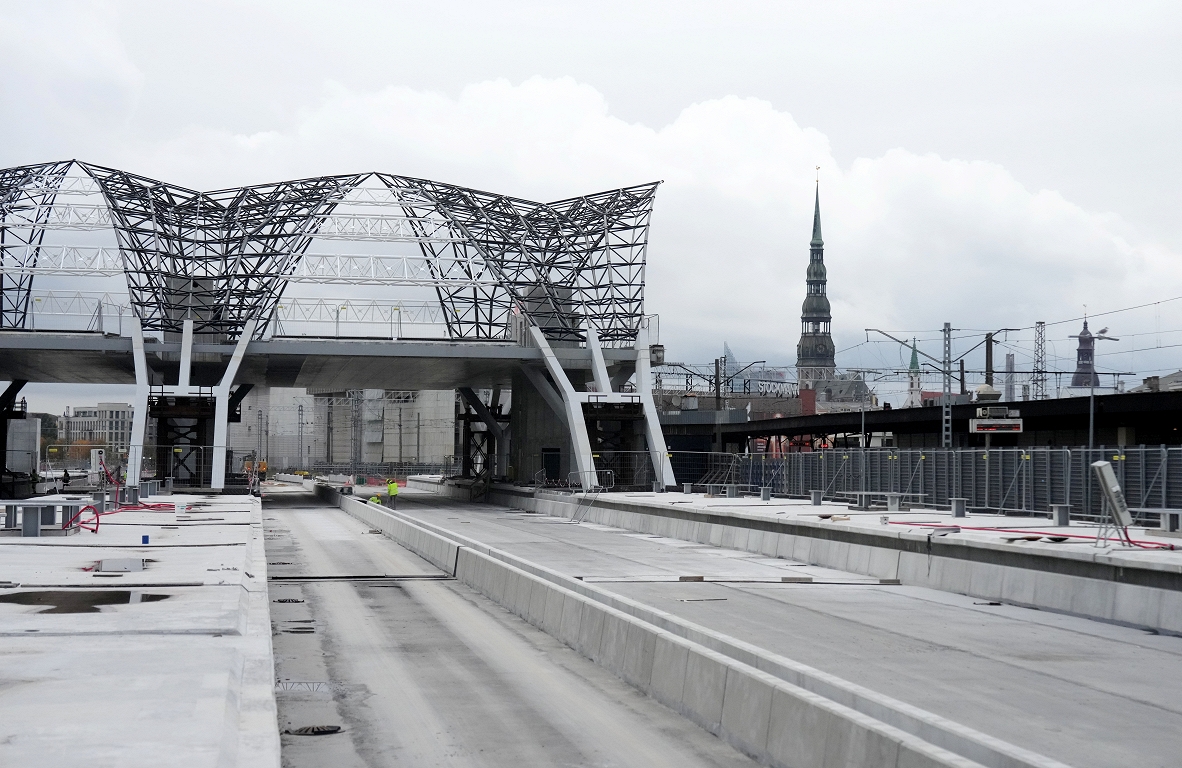Construction / Day of Rail Baltica Riga Central Station building

By attracting funding from the European Union’s Recovery Fund, the EDZL, in cooperation with the Ministry of Transport, has signed an agreement with the Bererix general partnership on the construction of the building of the southern station of Riga Central Station.
The builder has resumed the construction work in April this year and will be completed on August 31, 2026.
The funding of the Fund, together with the European Infrastructure Connecting Instrument (CEF) and Latvian state funding, will allow the construction of the southern part of the station building, the building to arrange the surrounding area and the improvement of passenger platforms so that the building can serve the railway passenger service in the summer of 2027.
The Recovery Fund will cover EUR 104.5 million, which is approximately 75% of the amount needed for the full project. Funding will cover the facade and roofing of the building, the improvement of railway platforms and the construction of passenger sheds, the construction of engineering networks and systems, including the construction of six lifts on the platforms and the interior decoration of the interior of the building.
Erik Diļevs, Chairman of the Board of EDDL, points out that the next task is to continue the work with the integration of railway track infrastructure into the new station system.
The financing agreement stipulates that by August 31, 2026, the builder must complete all essential construction works, including the facade of the building, the roof, the work of the railway platform and the most important works of engineering networks and systems. By 31 December 2026, the ground floor of the building’s passenger premises must be completed. Next work from CEF 9 must be completed by March 31, 2027 – a six 1,520 millimeter attached to the station building, or the safety tests, inspections, landscaping and transfer of the existing railway tracks.
Guntis Āboltiņš-Āboliņš, head of Bererix, explains that the deadlines for construction are very tense, mainly because the production of the roof and facade system of the building must be ordered in a timely manner and cannot be accelerated due to unique structures. However, when mobilizing resources, starting work on redesign and ordering the necessary structures immediately, Aboltin-Āboliņš requires that the works can be done within the specified deadlines.
It has already been reported that the European Union (EU) Economic and Financial Affairs Council (ECOFIN) meeting on 18 February approved amendments to the Latvian Recovery Fund plan in Brussels, with a project of EUR 114 million for the Rail Baltica project. The funds will be diverted to the construction of the southern part of Riga Central Railway Station.
The amendments provide for the redistribution of funding for investment of the Ministry of Transport. Money at the station has been redistributed to the continuation of the construction work, withdrawing the Riga high -speed public transport line project for € 40 million and the creation of a non -unemidged train charging infrastructure for € 74 million.
The EDZL is a fully -owned capital company and its share capital is EUR 4.445 million.
« Rail Baltica » Riga Central Node is being constructed by « Bererix », construction supervision is provided by « Egis-Deutsche Bahn », but the customer is EDZL. Project funding for eligible expenditure is provided by 81-85% of the European Infrastructure Connecting Tool, and the remaining part of the Latvian state budget.
The Bererix general partnership has united Belgian construction company « Bessix Group », Latvian Builder « Rere Būve » and Italian builder « Rizzani de Eccher » to implement the Riga Central Railway Station Complex, a new European width of track and railway bridge over the Daugava, embankment and fitting infrastructure.
It has already been reported that Rail Baltica’s first round costs in the Baltics could reach EUR 14.3 billion, of which in Latvia – EUR 5.5 billion, but there is a potential savings of up to € 400 million in the optimization of technical solutions and other savings.
The total cost of the project, according to cost and benefits analysis in the Baltics, can reach EUR 23.8 billion. In the previous cost and benefit analysis in 2017, the project would cost a total of € 5.8 billion.
The Rail Baltica project envisages the creation of a European standard railway line from Tallinn to the Lithuanian -Polish border so that the Baltic States can be further connected to other European countries. It is planned to build a new, 870 -kilometer European railway line (1435 mm) railway line with a maximum speed of 240 kilometers per hour.








